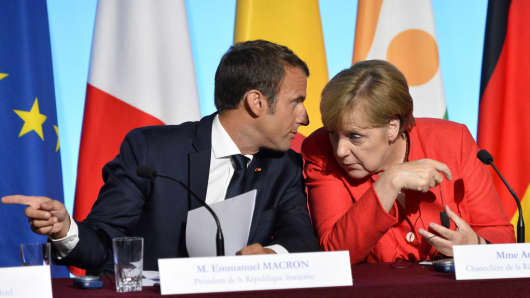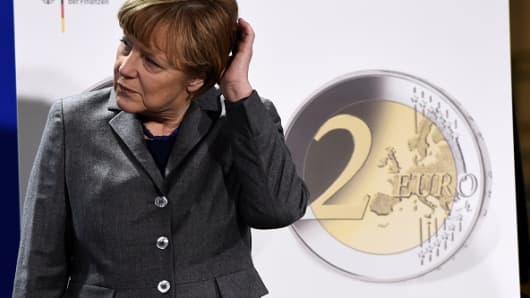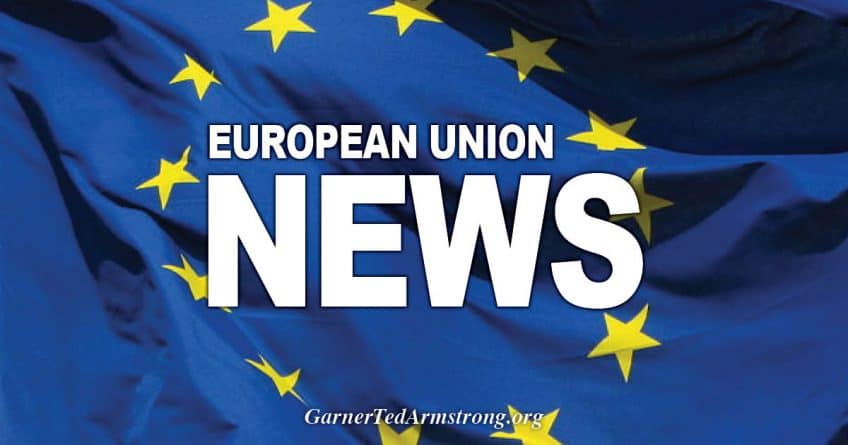The German chancellor’s comments came a few weeks ahead of a key EU summit, where many leaders, especially French President Emmanuel Macron, want to sign-off on specific policies to upgrade the euro zone.

French President Emmanuel Macron and German Chancelor Angela Merkel during a press conference at Elysee Palace on August 28, 2017 in Paris, France.
German Chancellor Angela Merkel ended her silence on euro zone reform by showing some willingness to increase risk-sharing — a long-standing issue for many politicians in Berlin.
Merkel on Sunday revealed her vision for the future of the euro zone bailout fund — the European Stability Mechanism (ESM) — and for an investment budget to support euro countries with structural problems, in an interview with the Frankfurter Allgemeine Sonntagszeitung newspaper.
Her comments come a few weeks ahead of a key European Union summit, where many leaders, especially French President Emmanuel Macron, want to sign-off on specific policies to upgrade the euro zone. Macron went as far as asking for a euro zone finance minister.
Many politicians in Europe had criticized Merkel for not setting out clearly her thoughts on euro reform.
“This is Merkel’s first attempt to lay out a position on euro zone reform,” Constantine Fraser, Europe analyst at TS Lombard, told CNBC via email.
“She knows she has to engage with demands for more risk-sharing, but also has to bring onboard the conservatives in her CDU-CSU (coalition), and act, in a way, as the spokeswoman for the skeptical smaller northern European countries.”
What’s Merkel proposing?
Merkel wants the ESM, which currently is responsible for lending money to economically fragile countries, to focus on strengthening budgetary discipline. Under her plans, the ESM would monitor each euro country to make sure they are following fiscal rules.
Other proposals, from the European Commission and France, have suggested the ESM should become an instrument to prevent future financial crises.
In Merkel’s eyes, the future ESM should provide long and short-term loans. The former should only be awarded if the entire euro zone was at risk and on the basis of deep structural reforms within the recipient country. Short-term lending should only be granted to countries suffering from external circumstances, such as a recession.

German Chancellor Angela Merkel attends a two-euro-coin presentation in Berlin on January 29, 2015.
Merkel was clear that the ESM should remain an intergovernmental institution. If Merkel receives support for her idea, then the different euro governments would have stronger powers when considering future bailouts.
Her second proposal, for a euro zone investment budget, seems less ambitious than an idea presented by France’s Macron, who wants to build a euro zone tool able to deliver fiscal stimulus to respond to economic shocks.
Merkel, on the other hand, wants the investment budget to deal with issues only in countries with fewer economic problems, in other words to support innovation and technology. Such investments should never exceed a figure in the low double-digits of billions. This mechanism would be overseen by the different euro parliaments.
“Paris and Berlin are still a long way apart — and Merkel’s proposals also still fall short of the architecture most economists think would be necessary to make the euro zone more robust,” Fraser from TS Lombard said.
He added that Merkel’s vision for an investment budget “is so small as to be macro-economically insignificant.”
Holger Schmieding, an economist at Berenberg, said in a note Monday that “while Paris praised her comments as a significant step closer to the positions that French President Emmanuel Macron laid out 250 days ago, Merkel did not break much new ground.”
What does this mean for the June summit?
The different European institutions and the French government want an agreement on euro zone reform at a summit on June 28. However, the differences of opinion between the two largest euro zone economies raise questions as to how far those reforms will go.
At the same time, recent government changes in Spain and Italy could also derail any significant achievements on euro reform.
“Italy’s new government will not make it easier to achieve a lot at the EU summit on 28-29 June. It may take a while for the Italian radicals to find their place in the European reform discussions and for other EU leaders to find out how fast and far the radicals in Rome may back away from their fiery campaign rhetoric,” Schmieding said.
Fraser also played down any significant achievements later this month. He said that “the June summit may be being billed — particularly by the French — as some kind of climactic moment in the debate on the euro zone, but with no hard deadlines or real sense of urgency I would be surprised if any particularly dramatic decisions are taken.”












